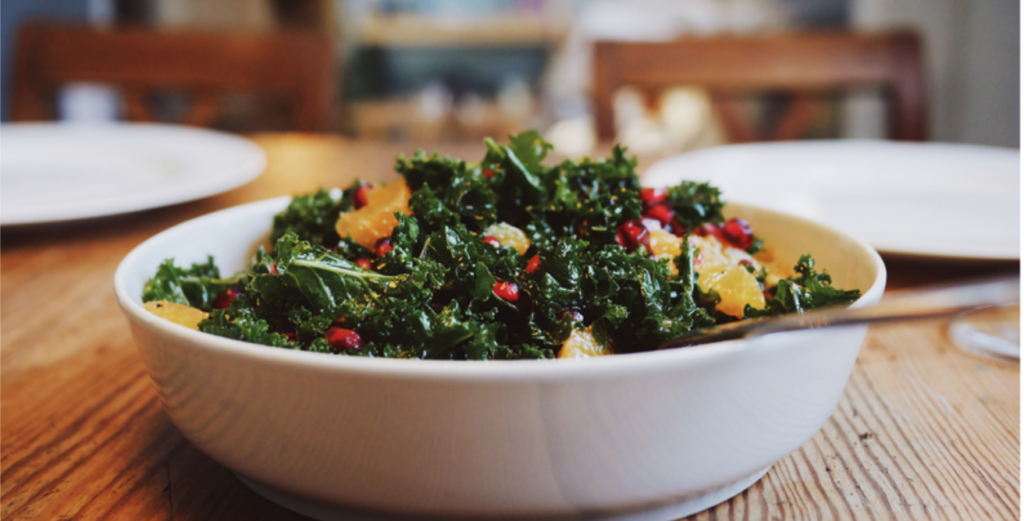
I love this kale salad, especially around the holiday season. It is so flavourful and decadent that it feels like a treat. Yet it packs a powerhouse of nutrition. The perfect combo to keep things in balance over the holidays!
Kale
You may already know that kale is fat-free, sugar-free, cholesterol-free and very low in sodium and calories. But did you know that kale boasts a wealth of nutrition? This balance makes it a great option for adding to your diet, particularly if you’re looking for low-calorie options or weight-friendly options. And a kale salad is an easy way to get more kale into your diet. Since kale contains so many vitamins and nutrients, it contributes to supporting many health benefits:
Good Eyesight
A 1-cup serving of fresh kale contains over 20% of the recommended daily intake of vitamin A, which supports eye health. A 100g serving of kale provides over 100% of the daily value for vitamin C, which has been associated with a lower risk of cataracts. Kale is also rich in lutein and zeaxanthin. These are antioxidants that reduce your risk of macular degeneration and other age-related eye diseases.
Healthy Heart
Kale contains plenty of nutrients that support heart health, including potassium, fiber, folate, and calcium. As part of a heart-healthy diet, kale may reduce the risk of heart disease by helping lower LDL cholesterol (“bad cholesterol”).
Lower Blood Pressure
Since kale contains high levels of magnesium, calcium, and potassium, along with other vitamins and fiber all working together, it can help lower blood pressure.
Strong Bones
Kale is also a source of calcium, which is needed to maintain the health and function of your heart and other muscles, as well as your bones and teeth.
Vitamin K is also critical for bone health. Just one cup (21 g) of fresh kale gives you an amazing 80.3 micrograms of vitamin K. That is a good chunk of the average recommended daily values of 120 micrograms for adult men over age 19 and 90 micrograms for adult women over age 19.
Nutrition
In addition to the nutrients mentioned above, kale is a good source of vitamin B6, copper, and manganese.
Pomegranates
This delicious salad contains fresh pomegranates. This, of course, is the most nutritious way to eat them. They are low in calories and fat, and high in fiber, vitamins, and minerals.
Pomegranates have a number of health benefits. Many of these benefits are due to the high level of antioxidants in pomegranates. Antioxidants are chemicals in foods that can help protect your cells from other, damaging chemicals and reduce inflammation. Did you know that pomegranates can have up to three times more antioxidants than green tea or red wine?
Other health benefits of pomegranates include the following:
Better heart health
One kind of antioxidant is called a polyphenol. Pomegranates are rich in polyphenols. There is some evidence that polyphenols help protect against diseases in your heart and blood vessels, such as:
- Atherosclerosis, a buildup of cholesterol and fats in your arteries that is a common cause of heart disease
- High blood pressure, which can cause a stroke if it’s left untreated
Pomegranates have polyphenol compounds that help prevent your artery walls from thickening and reduce the buildup of cholesterol and plaque.
Reduced risk of some cancers
Because pomegranates are rich in antioxidant flavonoids, they help prevent free radicals from damaging your cells. In some early studies, pomegranates show potential to prevent prostate, breast, lung, and colon cancers.
Support your digestive health
Early research shows that pomegranates may have prebiotic effects. Prebiotics are substances in your food that your helpful gut bacteria break down for nutrients. Feeding your good gut bacteria helps support the health of your digestive system. Your gut microbiome plays an important role in protecting you from chronic diseases, such as inflammatory bowel disease (IBD), type 2 diabetes, heart and blood vessel disease, and colorectal cancer. Whole pomegranate seeds also have a lot of fiber, which is another way to help keep your digestive system healthy.
Support your brain health
Specific polyphenols found in pomegranates can help reduce inflammation throughout your body. Early studies have shown that these polyphenols called ellagitannins may help protect your brain against Alzheimer’s disease and Parkinson’s disease. This is because they can fight the destructive effects of free radicals and inflammation in your brain.
Support your joint health
A systematic review of studies in test tubes, animals, and humans showed that the antioxidants in pomegranates may help ease symptoms and prevent complications in people with rheumatoid arthritis. Another study showed that pomegranate may also prevent osteoarthritis, likely due to its anti-inflammatory effects.
Indulge, share and enjoy guilt-free
Partaking in food is a tradition we all enjoy during the holidays and special occasions. Enjoy this delicious kale salad with zero guilt and share it with those you love.

Kale & Pomegranate Salad
Ingredients
- 4 cups kale destemmed & torn into bite-sized pieces
- 1 cup pomegranate seeds
- 1/4 cup slivered almonds toasted
- 1 cup mandarin slices
- 1 tbsp olive oil
- 1 tbsp lemon juice
- 1 tsp agave nectar or maple syrup
- salt and pepper to taste
Instructions
- In a large bowl, massage kale with olive oil until slightly wilted
- Add pomegranate, mandarin slices, and slivered almonds
- Whisk together lemon juice, agave, salt and pepper
- Drizzle dressing over salad and toss to coat
- Serve immediately or chill before serving
Leave a Reply